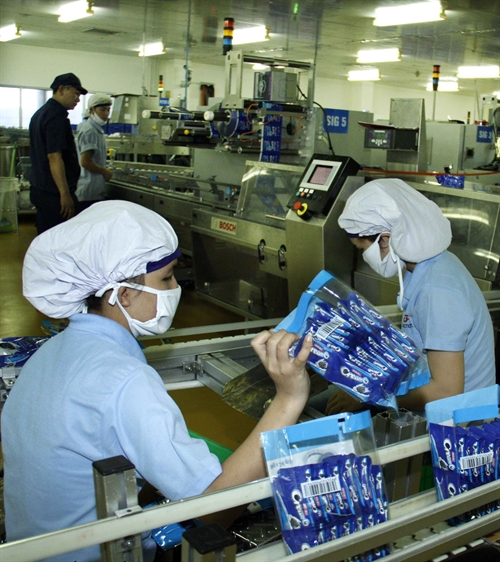 Economy
Economy

Vietnamese businesses which have never exported Siluriformes fish (catfish) products to the United States have been asked to temporarily stop registering exports to that country.
 |
| Tra fish being processed for export at Phát Tiến Seafood Company in Đồng Tháp Province. Vietnamese companies which have no experience exporting catfish products to the United States have been asked to temporarily stop registering exports to the country. – VNA/VNS Photo Vũ Sinh |
HÀ NỘI — Vietnamese businesses which have never exported Siluriformes fish (catfish) products to the United States have been asked to temporarily stop registering exports to that country.
The move follows a message sent to the National Agro, Forestry and Fisheries Quality Assurance Department (NAFIQAD) by the US Department of Agriculture (USDA)’s Food Safety and Inspection Service (FSIS), reporting a number of regulations relevant to the export of Siluriformes fish to the United States.
FSIS is conducting an evaluation of the Vietnamese food safety control system on Siluriformes fish. Once completed, FSIS will consider adding new businesses to the list of qualified exporters.
According to the United States’ 2014 Farm Bill, which came into effect in March this year, catfish exports will fall under the regulatory jurisdiction of FSIS and not the US Food and Drug Administration.
Under the bill, Vietnamese tra fish exports and many other Siluriformes fish products have had to struggle with the USDA’s final inspection rule.
The final regulation, released by FSIS, will be applied on both locally raised and imported Siluriformes fish.
From March 2016, an 18-month transitional implementation period for both domestic and international producers will begin. Therefore, FSIS’s regulations will be wholly applied from September 2017.
During the 18-month transitional implementation period, FSIS will only allow those Vietnamese businesses which previously exported Silurifomes fish products to this market.
Director of NAFIQAD Nguyễn Như Tiệp said FSIS required all businesses processing Siluriformes fish products for the United States market, from slaughtering, filleting, freezing to packaging, to have their names included on the list of businesses eligible for export to the North American country, released on the FSIS website.
Tiệp said NAFIQAD had sent a proposal asking FSIS to avoid applying this rule for all Vietnamese processing units, instead, making it applicable only for those businesses that were executing the final processing phase before exporting the fish products to the United States. As for the remaining units, NAFIQAD would be in charge of examining and certificating food safety conditions.
While waiting for the FSIS’s reply, NAFIQAD said processing businesses and exporters should buy Siluriformes fish products from units which had already been included on the eligible list released on the FSIS website.
Việt Nam, currently, has 60 businesses eligible for exporting Siluriformes fish products to the United Stated, mentioned on the FSIS website.
Tra fish export value down
Tra fish export value this year was expected to drop by 4 per cent compared to US$1.6 billion last year due to declining demand, according to the Ministry of Finance’s National Institute for Finance.
Dương Hoàng Lan Chi, the institute’s expert, said increased cod fish supplies in the European Union (EU) would affect consumption of tra fish in the world, while some other countries such as China, India and ASEAN nations have encouraged development of catfish production at home to reduce imports.
In addition, she said, Việt Nam’s tra fish exports to the US has also faced difficulties due to the US catfish inspection programme that came into effect in March 2016 and competition with other white-meat fish products in the US market.
Meanwhile, tra fish processors for export have lacked raw material for processing due to higher cost of breeding at farms, according to experts.
Dương Ngọc Minh, deputy chairman of the Việt Nam Association of Seafood Exporters and Producers (VASEP), said enterprises have developed production of raw material of tra fish but lacked co-operation with farmers. The enterprises have also not been able to forecast demand and supply of the market, resulting in a lack of raw material of tra fish for processing activities.
So far of this year, the raw material has been reduced by 40 per cent against the same period last year and was expected to lack 50 per cent by the first quarter of 2017, he said.
The lack of raw material has pushed up the price of tra fish up from VNĐ18,000-19,300 per kilo to VNĐ20,300-20,800 per kilo in the second quarter of this year, said Lan Chi. But the increased price was still lower than breeding cost at VNĐ22,000-23,000 per kilo.
Therefore, farmers have not been interested in expanding production of tra fish.
Lan Chi expects tra fish sales would not fetch VNĐ23,000 per kilo by the end of the year so the shortage of tra fish for processing would remain until next year and the farmers would not actively expand their investment to tra fish breeding.
To develop production and exports, co-operation between enterprises and farmers should be promoted while quality products should be improved to international standards, she said.
She also proposed developing export markets via international fairs and e-commerce to reduce the cost of accessing export markets. - VNS




